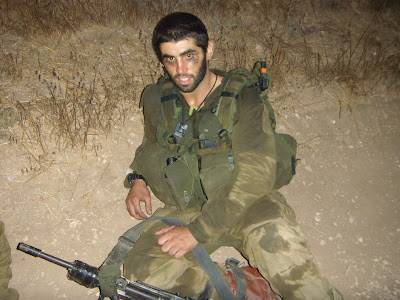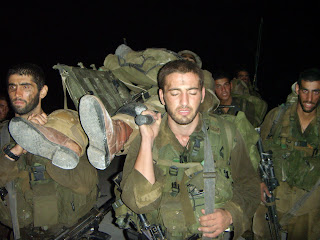This month is considered to be the Jewish Holiday Season. Last week was "Rosh Hashanah," the Jewish New Year, this week is "Yom Kippur," the day of Atonement, and next week is "Sukkot," the holiday remembering the Jews 40 years of wandering in the desert.
Last week we were given off Monday, Tuesday, and Wednesday for the holiday. I spent the first night with one of my friends from my team that lives relatively close by, and the second night with my family from the kibbutz.
This is actually my second Rosh Hashanah in Israel, and I have noticed that there are some customs that people keep here that I have never seen before in the U.S. For instance, I am familiar with eating apples and honey to signify a "sweet New Year," but in Israel there are several foods that are significant to Rosh Hashanah for different reasons:
-The Pomegranate is eaten because it is said to have 613 seeds, the same number of Mitzvahs that are described in the Torah.
-The head (or meat from the head) of usually a sheep is eaten in the hopes that we will be leaders and not followers in the upcoming year. (I can definitely say that I had never eaten "head meat" before, but it tastes kind of like brisket)
-Dates symbolize our wish to remove evil (apparently something to do with the word Date in Hebrew - Tamar, which is connected to the word Tam - meaning cease to exist. Sounds like kind of a stretch to me)
-Squash relates to our hopes in the High Holy Days that G-d will read our good deeds and tear up any list of bad deeds (again realting to the Aramaic word for squash)
-The word for leek is connected to "cutting," and symbolizes our wish that our evil deeds be cut down, or our enemies decimated.
-Black-eyed peas represent the wish that our merits will increase in the New Year
Those are some of the blessings that I encountered (I actually had to look most of those up because even most Israelis don't remember why they eat each thing). It is a meal before the meal, which makes for a pretty long dinner.
When we went back on Thursday we spent the day learning how to read topography maps for our upcoming navigation training. This Sunday we started the navigation training by going out in the field and seeing how the map translates to actual hills, rivers, valleys, etc. Monday we drove to a popular navigation training ground and practiced getting from point to point in small groups with commanders. Tuesday we were supposed to travel to the same place and get a little bit more advanced (navigating with out the map), but there were some logistical problems and our bus didn't come. So we spent the day navigating in the area around our base (still pretty big, but the main difference is that the various landmarks are less pronounced, thus making it more difficult for novice navigators).
Truthfully, no one seemed to have a problem navigating during the day. The problem is that none of our real navigations (the ones we will do in pairs, or alone, with significant weight) will be during the day. You would be surprised how hard it is to tell distances, or try and make out how many hill tops there are in the dark.
We were supposed to stay on the base and guard during Yom Kippur, but yesterday (the day before Yom Kippur) our commanders told us we would all be going home. I am not one to complain about time off, but as a result we had to go to sleep early and we actually did very little navigation at night. In my case I didn't do any at all. I was in a group of three and the first navigator got significantly lost, and by the time we figured out where we were it was time to get back to the base. However, I'm not too concerned we have another 8-10 weeks of navigation training in the future, so I'm sure I'll get a chance.
Today is what is known as Erev Yom Kippur, or Yom Kippur Eve in Christian terms. It means that the fast starts tonight at sundown and lasts until sundown tomorrow. Because last Saturday we turned our clocks back sundown starts at 5:30.
What is really interesting about my first Yom Kippur here in Israel is that it really illustrates the divide between the religious and the secular. In the U.S. most Jews I knew fell somewhere in the middle, but here it is very black-or-white. There are religious Jews, who pray three times a day and wrap Tefillin.
http://en.wikipedia.org/wiki/T%27fillinAnd there are secular Jews, who may have never seen the insided of a Temple or know a single prayer. I learned that to fast on Yom Kippur also means not to turn on any lights, including turning on a television or starting a car (technically I think that means I have already broken my fast by using the computer). When I got home from the army to the kibbutz I thought I would eat my last meal around 5, before the sun went down. When I walked in to my adopted family's house I was informed that dinner would be served around 8. They said they had not even thought to ask whether or not I fasted for Yom Kippur.
I feel like in the U.S. most people try and make an effort to fast. Here either you fast or you don't even think about it. I heard one of the soldiers this morning turn to his friend and ask if he was planning to fast, his response, "Yeah - for an hour or two!"
Here I am in the "Jewish State" and if it weren't for the fact there is absolutely no transportation until tomorrow night at 8, you wouldn't even know it is the most solemn and important day of the year. Not that it bothers me, I just find it a little strange.








